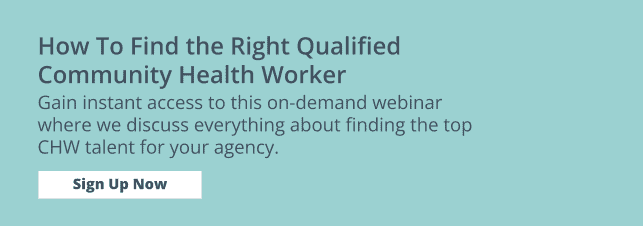The number of community health workers nationally is on the rise. Many agencies have discovered that these community health specialists are the key to reaching people who are often left out of traditional healthcare. And program directors are eager to have CHWs work in their teams.
Want insights like this in your inbox? Subscribe to our CHWTraining newsletter.
CHW Job Outlook and Growth
The employment of CHWs is projected to grow by 13% from 2023 to 2033, which is much faster than the average for all occupations. This indicates a strong demand for CHWs in the healthcare sector.
The median pay for CHWs in 2024 was $51,030 per year (or $24.54 an hour), and most positions only require a high school diploma and short on-the-job training.
About 7,500 CHW jobs open up each year, mostly because of workers retiring or moving into other careers, which means there are many chances to step into this field.
CHWs Save Money and Improve Health
The positive results of working with CHWs—and promotores, health advisors, community care managers, and similar—are clear. A recent study shows that working with a team of CHWs can lower emergency department visits (5%), drop hospitalizations (12.6%), and add up to a net savings of $1,135 per patient. The study showed that each CHW generated a net savings of $170,213 every year.
It’s no wonder why you’d like to hire a CHW or cross-train your internal team to be CHWs in this growing field. But you might be wondering where CHWs work, and if they’d be a good match for your organization. You might want to improve the health outcomes of your community no matter if you work in a clinic, a neighborhood, or a faith-based group. Do CHWs fit there?
The short answer is, “Yes!” CHWs anywhere have a similar role to link people with health and social services to improve the quality of care, but they work in many settings. They work wherever they live, including in rural areas, urban settings, and major metropolitan hubs. They work in borders and tribal communities in AI/AN nations. The most common work environments of CHWs according to the BLS are:
| Employer | Percentage |
| Social Assistance | 20% |
| Ambulatory healthcare services | 17% |
| Religious, grantmaking, civic, professional, and similar organizations | 15% |
| Hospitals; state, local, and private | 10% |
Keep reading to learn seven specific work environments where CHWs are often employed.
11 Places Where CHWs Work
- State and local governments
- Clinics and hospitals
- Outpatient care centers
- Insurance companies
- Nursing care facilities
- Nonprofit groups
- Faith- and community-based groups
- Schools
- Libraries
- Accountable Communities of Health (ACHs)
- Rural and Tribal Communities
1. State and local governments
Many local governments (states, counties, and cities) employ CHWs. Many state governments are also responsible for creating programs and providing training so CHWs can move on to work in other areas.
Government agencies and efforts like Accountable Communities of Health (ACHs) are often dedicated to reducing the incidence of chronic health issues. They match up CHWs with prevention programs where they can be effective, particularly among low-income populations.
2. Clinics And Hospitals
CHWs typically form part of the care team at clinics, hospitals, and primary care agencies. They’re assigned a client and visit them at home to coordinate clinic visits. They also create health management goals that promote self-management of disease and prevention.
Agencies use CHWs to help high-risk and high-needs patients. These patients sometimes go into the ER or hospital when they don’t need to. CHWs can address the social determinants of health that might be influencing them.
3. Outpatient Care Centers
CHWs are key team members in outpatient care centers including behavioral health centers, hospital facilities dedicated to ambulatory procedures (X-rays, testing and examinations, and more), and other non-emergency care centers.
Some of the tasks a CHW can perform at an outpatient care center include facilitating communication if there are language barriers, help patients through the check-in process (filling forms, obtaining relevant medical information), and care coordination (pre- and post-visit, including transportation arrangements and access to other resources).
4. Insurance Companies
CHWs are the primary point of contact between a patient and the insurance company. They often go above and beyond providing strictly medical care to patients. They help guarantee the patients’ access to the care they need in order to improve their health outcomes. This, in turn, means lower patient-related costs for the healthcare system.
One of the main roles of CHWs in insurance companies is to help their community access medical care. CHWs can work with patients by:
- Advising them on healthcare and insurance plans
- Assisting in the signup process (forms and requirements, medical history, and beyond)
- Helping them access timely care
5. Nursing Care Facilities
CHWs are in a unique position to support patients in nursing care facilities, including elderly, those with chronic illnesses, or others needing long-term care. They share an understanding of the patient’s background in a way other healthcare workers don’t.
In a nursing home, CHWs can assist patients in securing treatment, advocating for proper care, arranging medical visits (including transportation, scheduling appointments, and even communication with the patient’s family), and functioning as caseworkers in the facility, monitoring changes and overall well being of the patient.
6. Nonprofit Groups
Nonprofits rely on CHWs to link communities with healthcare and other support systems.
Some of the tasks CHWs perform for nonprofits include community outreach, widespread screenings, vaccination coordination, peer educator services, home visits, chronic illness management, and more.
Local and international organizations rely on CHWs to reach target populations and provide the preventive care and treatment the community needs. In fact, even if you’re not familiar with CHWs, you’ve likely seen their work in low-income communities and even countries. Vaccination programs in Africa are a good example.
7. Faith- And Community-Based Groups
The cultural background of CHWs and their community is an added bonus when it comes to serving in local initiatives. This is the case for religious groups, grassroots organizations like youth centers, and other similar initiatives.
CHWs are invaluable team members because of their closeness to the community they serve. Shared experiences, a common upbringing, and cultural sensitivity set CHWs apart and enable them to create deep bonds with their patients and clients.
8. Schools
Schools are the perfect place to offer health support to communities. However, they usually have a gap in health resources. CHWs are being used in some communities to help support student health. It’s a great opportunity to address childhood chronic conditions.
One study of CHWs in schools describes the venue:
Outside of the healthcare system, schools—where youth spend a majority of their waking hours—are recognized as importance venues to promote a culture of health by providing chronic disease management and preventive services to students. Impacts of school-based health services include improvement in academic performance, increased access and utilization of health services, as well as better management of health conditions among students.
9. Libraries
Public libraries are community hubs that are also being used as public health partners. Some are hiring community health workers to connect with the public and provide them healthcare resources. It makes sense, because they’re already in communities, they have branches or mobile libraries even in remote locations and their missions link up well with that of public health.
The Charleston County Public Library offer women “healthcare resources in the areas of maternal and reproductive care, infectious disease, and mental health.”
10. Accountable Communities of Health (ACHs)
CHWs are playing a bigger role in partnerships called Accountable Communities of Health, or ACHs. These are groups made up of healthcare providers, public health workers, schools, housing services, and others who work together to improve health in the community. CHWs help connect people to these services and make sure care is focused on what matters to the community.
11. Rural and Tribal Communities
In rural and tribal areas, community health workers—and community health representatives (CHRs) in tribal nations—often take on many roles. They help people manage chronic conditions, get mental health care, find housing, arrange transportation, and access healthy food.
CHWs and CHRs are trusted because they understand the culture and unique needs of the people they serve. Their support is especially important in areas where healthcare and other services are limited or difficult to reach.
These 11 places are just a few examples of where CHWs are making a difference. Many communities have created new and creative ways to use CHWs based on their unique needs.
No matter where CHWs work, it’s important that they’re well trained. Many states now offer or require certification programs to help standardize training. Most are based on the National C3 Council, which outlines core skills every CHW should have, like communication, service coordination, and cultural responsiveness. Whether you’re hiring CHWs or helping them grow, these standards can help you build a stronger, more effective team.
Originally published May 2021. Last updated May 2025 to include current job statistics, new CHW work settings, and certification trends.


